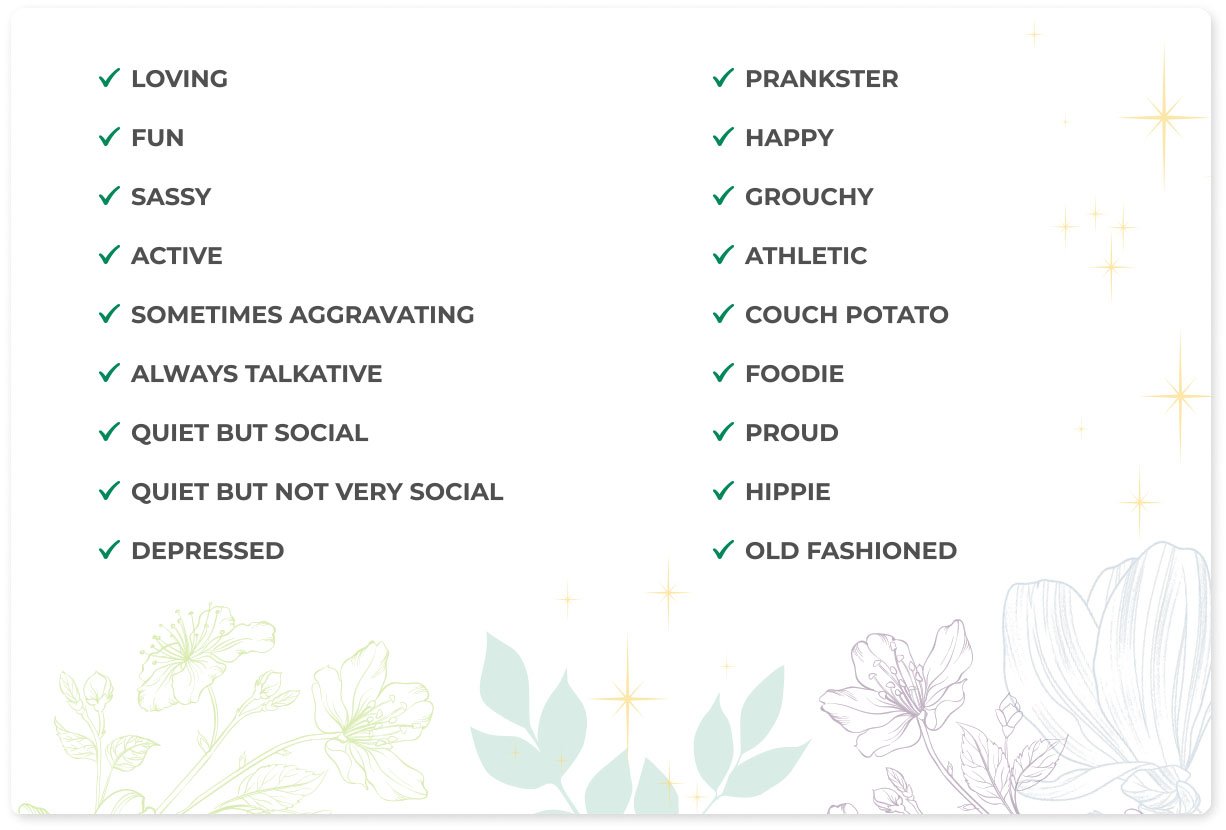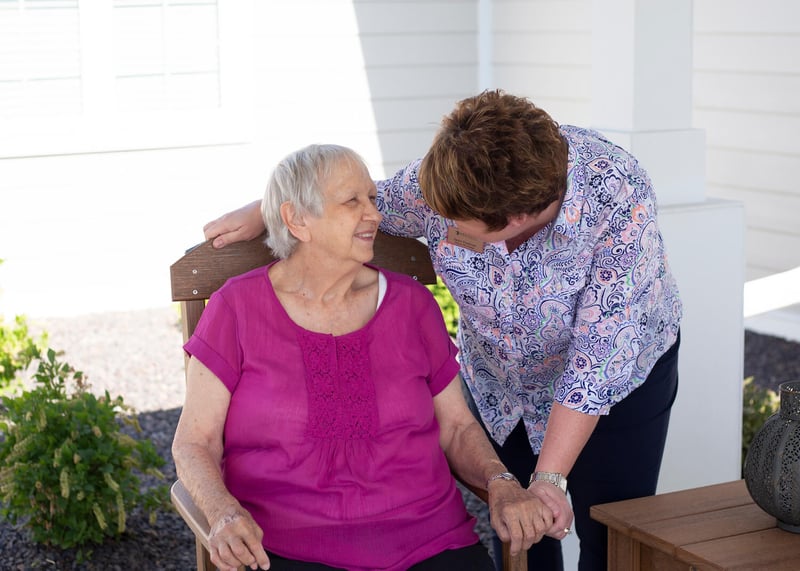Most of us know that a senior living community is for adults age 55 and older, and it’s designed to suit various lifestyle desires and care needs. Beyond that, it’s easy to get confused as to what defines a senior living community and what you and your loved one should look for when narrowing down choices.
Perhaps you’re at the point where you’re Googling whether your aging parent needs senior living, in which case you have probably already assessed their needs on some level. Now, you’re probably trying to make sure it’s the right choice before you initiate any extended family conversations about the topic or start touring communities.
To ease this anxiety, we’re clarifying what to expect when it comes to senior living communities. We’ll also detail the different types of lifestyles and levels of care available, including independent living, assisted living, and memory care.
Does my loved one need a senior living community?
We’ll start with the first, most important decision: Does your parent or loved one need a senior living community? It’s often not a simple “yes or no” answer, but knowing what to expect from a senior living community can make the decision easier.
First, if you haven’t done so yet, take your senior parent’s or loved one’s physical and medical needs into consideration. If your loved one already requires some sort of care, including help with everyday activities, you likely have a ballpark idea of what their day-to-day needs would be in a senior living community.
If you’re not sure which everyday activities they need help with, begin with a professional evaluation. Physicians and other healthcare professionals often measure a senior’s activities of daily living (ADLs) or instrumental activities of daily living (IADLs) to determine how much supplemental care is needed.
Although only healthcare professionals can make a clinical diagnosis or recommend specific treatments, you can use the physician’s list of ADL and IADL questions to get a better idea of your loved one’s needs. There are even downloadable lists available to guide you through the assessment.
TIP: It’s never too early to start the conversation.
What does your loved one want for their future, and what are their plans as they age? Even if your parents or aging loved ones are currently healthy and able, it’s never too early to discuss what they want for their lives as the years progress. Having this conversation early on and understanding each other’s expectations can make the transition a bit easier when they need more assistance.
What are the senior living lifestyle options?
To gain a deep understanding of these care types, you can find details about the difference between senior living lifestyle options on our blog, plus more helpful advice for choosing a community that works for your unique needs. But for a quick overview, In most senior living communities, the lifestyle options include the following:
Independent Living
Independent living communities are for active seniors who are ready to leave behind the hassles of owning a house for a maintenance-free life where they can just do what they enjoy without unnecessary stress.
Assisted Living
Assisted living communities balance assistance with daily activities and independence. Each resident in an assisted living community has a lifestyle designed around what is appropriate for their wants and needs.
Memory Care
Memory care communities help seniors with Alzheimer’s disease and dementia. Like assisted living, memory care is tailored to each individual, working to keep them safe while empowering them to enjoy activities they love. Staff in memory care communities are accustomed to providing care to individuals with Alzheimer’s disease and dementia.
What if I think my loved one wouldn’t enjoy senior living, despite needing help with daily activities?
Let’s approach the question this way: Take a look at the list below. Do any of the following words and phrases refer to your parent or loved one?

If that seems like a wide, random range of people and personalities, you’re absolutely correct. That’s because you’ll find plenty of personality types in senior living communities. Today’s senior living communities are well-equipped to meet the lifestyle needs of a broad range of people.
With today’s amenities and services, senior living communities can help your loved one live their best life and remain active as they age. Communities exist for almost any “type” of person and cater to a number of special interests—it’s just a matter of finding the right community.
TIP: Don’t be swayed by stereotypes.
It’s easy to associate clinical and hospital-like stereotypes with senior living. After all, how many times have we seen that outdated portrayal in the media? That outdated image can make for dramatic fictional storylines, but here’s the truth: Instead of resembling hospital wards, today’s senior living communities are vibrant, active, dynamic places to live—they have a lot to offer just about every senior.
What should you look for in a senior living community?
So, you’ve determined that your loved one will benefit from the services and benefits of a senior living community. How do you decide which community is the right one? Let’s dig into some specifics.
Will the community meet my loved one’s needs?
If you’re just beginning your search, the first thing to look for in a senior community is the availability of services required to meet your loved one’s medical and physical needs.
Take these questions into account when making this determination:
- Do they need medication management?
- Do they need help with their IADLs (i.e., cooking, cleaning, and so on)?
- Is memory care going to be necessary now or in the foreseeable future?
- Are there dietary needs or restrictions that should be considered?
After assessing your loved one’s needs, do ample research on communities in your desired area that offer services to meet them. Most research can be done online, but we recommend having a conversation with a community representative to get the information you want and to book a tour to see the community in person.
Will the community provide things my loved one wants?
Once you’ve compiled a list of places that can meet these requirements, take into account what your loved one just plain likes, wants, and what will make them the most comfortable. Consider factors such as the following:
- Distance from family and friends
- Family and guest visiting schedule
- Common rooms or places to host events
- Amenities (i.e., yoga, cultural outings, or chef-quality food)
- Access to transportation to off-site activities
- Types of residences the community offers
TIP: Take advantage of virtual tours.
When you get to the stage of touring communities, most communities provide the opportunity to take a virtual tour if that is your preference. This measure adds both safety and convenience, for example, so that you and your sibling in another state can tour a community together at the same time.
Need more information before initiating the conversation?
Even with access to the right information and resources, there’s a lot to consider when looking for the right senior living community for your loved one. It’s one thing to determine what they need, but another task altogether to find it because there are so many options available. From there, someone needs to initiate the conversation. You can simplify this process by breaking it down into smaller, more manageable steps, and by enlisting some support.
With a little help, this process can be significantly easier. Start by involving your loved one as much as possible and appropriate. Ensure to include your siblings, mutual friends, or other family members in the decision-making process. Decide together who will lead the conversation, and brainstorm ways to keep it positive and productive.
For additional advice on how to approach this discussion with compassion, take a look at our comprehensive guide, Having the Conversation: Talking to a Parent About Senior Living.
Originally published March 2021. Revised November 2023.





